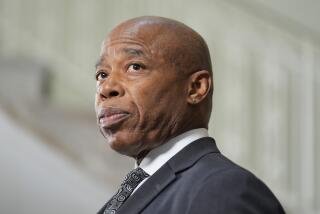Half in Poll Say Media Biased and Inaccurate
Almost half the people in America think the news media are generally inaccurate and politically biased, according to a poll released Wednesday by the Pew Research Center for the People and the Press. Slightly more than half of those polled said the media try to cover up their mistakes and get in the way of society solving its problems.
Only 35% of the respondents said the media are careful not to be biased, willing to admit their mistakes and help society solve its problems.
The 1,500 adults polled in the nationwide telephone survey conducted Nov. 13 to 19 were almost evenly split over whether news organizations “usually get the facts straight.”
Overall, Americans remain deeply divided over how good a job the news media are doing these days--and what they should be allowed to do--especially in covering the war in Afghanistan and terrorism in the United States.
The Pew poll showed that Americans continue to support the military, for example, in any dispute over what should be published or broadcast. Eighty percent said censorship of news from Afghanistan is a “good idea”--similar to the numbers recorded during the Gulf War--and 62% gave the same answer about news on anthrax.
Asked which is more important--the government’s ability to censor any news it believes is “a threat to national security” or the media’s ability to report news they believe is “in the national interest”--respondents favored the government 53% to 39%. Asked whether the military should have more control over the media or whether the media should decide how to report, they again sided with the military, by a margin of 50% to 40%.
But previous polls have shown a larger margin favoring military control--generally by a 2-1 ratio--and the media’s standing with the public also improved in other areas. Indeed, 69% of the respondents said the news media “stand up for America”--an increase from 43% in early September, before the terrorist attacks--and 60% said the media “protect democracy.” Only 17% said the media are “too critical of America”; 19% said the media “hurt democracy.”
The number who say the media care about people has doubled, from 23% to 47%, since early September, and the number who say the media are moral has increased from 40% to 53%.
When asked specifically in the current Pew poll about the quality of media coverage of terrorism, 77% of the respondents answered favorably; 30% said it was excellent and 47% said it was good. In mid-September, a few days after the terrorist attacks, the favorable rating was 89%, with 56% saying coverage was excellent and 33% saying it was good.
Americans clearly want news, not propaganda. More than twice as many respondents said the media should be neutral rather than “pro-American,” and 73% said the media should “show all points of view,” rather than the 20% who said they should be “pro-American.” By a much smaller margin, they said journalists should “dig hard to get all the facts” (52%), rather than just “trust officials” (40%) to tell them the truth.
Respondents also said, by a 54% to 32% margin, that media criticism of political leaders prevents wrongdoing rather than keeping the officials from doing their jobs. That margin was greater in earlier surveys, though--67% to 17% in June 1985--and public opinion on most of these questions is clearly volatile. In every case where the same questions were asked in previous Pew surveys, the media fared very well in the mid-1980s, declined sharply in February 1999 and early September of this year and rebounded in the current survey, though not to the same levels as in the mid-1980s.
In October 1985, for example, those who said the news media usually get the facts straight outnumbered those who said reporting is usually inaccurate by a 55% to 34% margin. By February 1999, those numbers were almost exactly the opposite--58% to 37% saying the media are usually inaccurate. The current 46% accuracy rating is the highest for the news media since 1992. On war coverage in particular, 65% of respondents said it has been accurate, compared with 17% who said the media have made too many mistakes.
As has been true in other polls over the years, conservatives tend to be more critical of the media and more supportive of government censorship, while liberals tend to be more supportive of the media and more critical of the government.
Among Republicans, 61% say the media are biased; among Democrats, the figure is 42%.
Among conservative Republicans, 89% said the government withholds information to “protect troops and public safety”; only 57% of liberal Democrats agreed. But 32% of liberal Democrats said the government withholds information to “maintain political support,” while only 8% of conservative Republicans agreed.
There are gender and education differences, as well as ideological differences, in Americans’ perceptions of the news media. Women and high school graduates are more likely than men and college graduates to say the media “stand up for America,” for example.
By and large, people who say they follow the news closely tend to regard the news media more highly than do those who aren’t especially attentive to the news. Overall, two-thirds of the people said they are now more interested in the news than they were before Sept. 11.
Cable television remained the major news source on terrorism for most Americans--53%, compared to 34% for newspapers, 19% for radio, 18% for local TV news, 17% for network TV and 13% for the Internet, according to the survey. But 44% said they get at least some news about issues related to terrorism from talk radio.
More to Read
Sign up for Essential California
The most important California stories and recommendations in your inbox every morning.
You may occasionally receive promotional content from the Los Angeles Times.










